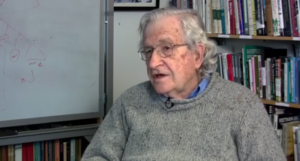
The 86-year-old Chomsky, whose writings have been required reading on college campuses for decades, said in an interview with GRITtv that he is still taken aback by the ugliness and the long tail of the racism America has inflicted upon Black people. Chomsky takes a longitudinal view that brilliantly and simplistically lays out the brutal precision of America’s grand design to keep Black people powerless and broken.
“This is a very racist society,” Chomsky said, “it’s pretty shocking. What’s happened to African-Americans in the last 30 years is similar to what [Douglas Blackmon in Slavery by Another Name: The Re-Enslavement of Black Americans from the Civil War to World War II] describes happening in the late 19th Century.”
In the aftermath of Emancipation, Blackmon describes a process by which America quickly created a legal system that found other effective ways to imprison and subjugate African-Americans—what Blackmon calls the “Age of Neoslavery.” These included the selling of black men convicted of crimes like vagrancy and changing employers without receiving permission.
“The constitutional amendments that were supposed to free African-American slaves did something for about 10 years, then there was a North-South compact that granted the former slave-owning states the right to do whatever they wanted,” Chomsky explained. “And what they did was criminalize Black life, and that created a kind of slave force. It threw mostly Black males into jail, where they became a perfect labor force, much better than slaves.”
“If you’re a slave owner, you have to pay for — you have to keep your ‘capital’ alive. But if the state does it for you, that’s terrific. No strikes, no disobedience, the perfect labor force. A lot of the American Industrial Revolution in the late 19th, early 20th Century was based on that. It pretty must lasted until World War II.”
It was in the two decades or so immediately after World War II that Chomsky says African-Americans had “a shot of entering [American] society.”
“A Black worker could get a job in an auto plant, as the unions were still functioning, and he could buy a small house and send his kid to college,” Chomsky said. “But by the 1970s and 1980s it’s going back to the criminalization of Black life.”
That was largely achieved through President Reagan’s “War on Drugs,” which Chomsky called a “racist war.” Reagan started it and President Clinton doubled down on it, changing laws to criminalize even more Black men.
“Ronald Reagan was an extreme racist—though he denied it—but the whole drug war is designed, from policing to eventual release from prison, to make it impossible for Black men and, increasingly, women to be part of [American] society,” he said. “In fact, if you look at American history, the first slaves came over in 1619, and that’s half a millennium. There have only been three or four decades in which African-Americans have had a limited degree of freedom — not entirely, but at least some.”
“They have been re-criminalized and turned into a slave labor force — that’s prison labor,” Chomsky concluded. “This is American history. To break out of that is no small trick.”


